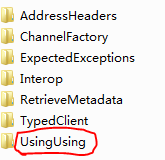(转)利用lambda表达式正确关闭WCF连接
原文地址:http://www.cnblogs.com/ILoveSleep/archive/2013/06/11/3132085.html
WCF是个好东西啊!用起来方便,功能强大,扩展性也比较大,但是WCF也有坑爹的地方,坑爹的地方就在于:
如何才能在客户端正确的关闭WCF连接!
如果你直接将客户端调用Close关闭,或者使用using语句,那你将是个悲剧,这点相信使用WCF的同志都知道的,因为ClientBase类的Close()方法被调用后,实际上是关闭了一个网络会话,并且会抛出异常!CommunicationException和TimeoutException!
这似乎违反常理,但确实发生了。因为一般来说Close函数都不会抛出异常。这个问题的解决办法是使用Try-Catch语句包含Close()方法,然后再异常处理中使用Abort函数释放资源!
同样,ClientBase类的IDisposable接口的实现函数Dispose方法中会调用Close函数,使用Reflector查看ClientBase<TChannel> 的代码便知

所以你使用using语句同样不能正确关闭WCF连接!而我们使用using语句就是为了不管发生什么情况,只要离开作用域之后,就会释放相关资源。而WCF的ClientBase类设计很明显违反了这一观念!简直是坑爹啊!
解决这一问题网上以后很多方案,首先说说微软的,也许是微软也意识到这一点,所以微软在提供的WCF示例程序中特意包含了一个叫做UsingUsing的示例,名字听起来有点怪

主要解决的方法是如下的代码
1 // This method shows the correct way to clean up a client, including catching the 2 // approprate Exceptions. 3 static void DemonstrateCleanupWithExceptions() 4 { 5 // Create a client 6 CalculatorClient client = new CalculatorClient(); 7 try 8 { 9 // Demonstrate a successful client call. 10 Console.WriteLine("Calling client.Add(0.0, 0.0);"); 11 double addValue = client.Add(0.0, 0.0); 12 Console.WriteLine(" client.Add(0.0, 0.0); returned {0}", addValue); 13 14 // Demonstrate a failed client call. 15 Console.WriteLine("Calling client.Divide(0.0, 0.0);"); 16 double divideValue = client.Divide(0.0, 0.0); 17 Console.WriteLine(" client.Divide(0.0, 0.0); returned {0}", divideValue); 18 19 // Do a clean shutdown if everything works. In this sample we do not end up 20 // here, but correct code should Close the client if everything was successful. 21 Console.WriteLine("Closing the client"); 22 client.Close(); 23 } 24 catch (CommunicationException e) 25 { 26 // Because the server suffered an internal server error, it rudely terminated 27 // our connection, so we get a CommunicationException. 28 Console.WriteLine("Got {0} from Divide.", e.GetType()); 29 client.Abort(); 30 } 31 catch (TimeoutException e) 32 { 33 // In this sample we do not end up here, but correct code should catch 34 // TimeoutException when calling a client. 35 Console.WriteLine("Got {0} from Divide.", e.GetType()); 36 client.Abort(); 37 } 38 catch (Exception e) 39 { 40 // In this sample we do not end up here. It is best practice to clean up the 41 // client if some unexpected Exception occurs. 42 Console.WriteLine("Got unexpected {0} from Divide, rethrowing.", e.GetType()); 43 client.Abort(); 44 throw; 45 } 46 }
其实就是使用try-catch语句捕获关闭时的异常!试想要是每次都这样调用WCF服务将会是多么痛苦的一件事情!网上也有人使用Linq的Expression来解决这一问题
于是我借用函数式编程的思想,设计了一个使用lambda表达式来解决这一问题的方案!
关键的函数很简单,一看便知道是我是怎样设计的!
1 public static class SvcClient 2 { 3 public static void Invoke<TClient>(Action<TClient> act) 4 where TClient : System.ServiceModel.ICommunicationObject, new() 5 { 6 TClient client = new TClient(); 7 try 8 { 9 act(client); 10 client.Close(); 11 } 12 catch (System.ServiceModel.CommunicationException) 13 { 14 client.Abort(); 15 } 16 catch (TimeoutException) 17 { 18 client.Abort(); 19 } 20 catch (Exception) 21 { 22 client.Abort(); 23 throw; 24 } 25 } 26 }
实际上这一设计的思想就是:将所有调用WCF服务的所有代码做为一个函数传入进来,然后我再内部使用try-catch语句包裹整个调用过程,这样就巧妙的将处理关闭连接异常的代码与实际调用过程分离开来!
函数的使用过程也比较方便
1 SvcClient.Invoke<Service1Client>(client => 2 { 3 //在此处添加调用WCF的代码 4 });
代码看起来比较简洁优美,个人比较满意,而且不用再担心调用结束后不能正确关闭WCF连接,资源不能正确释放的问题了!




